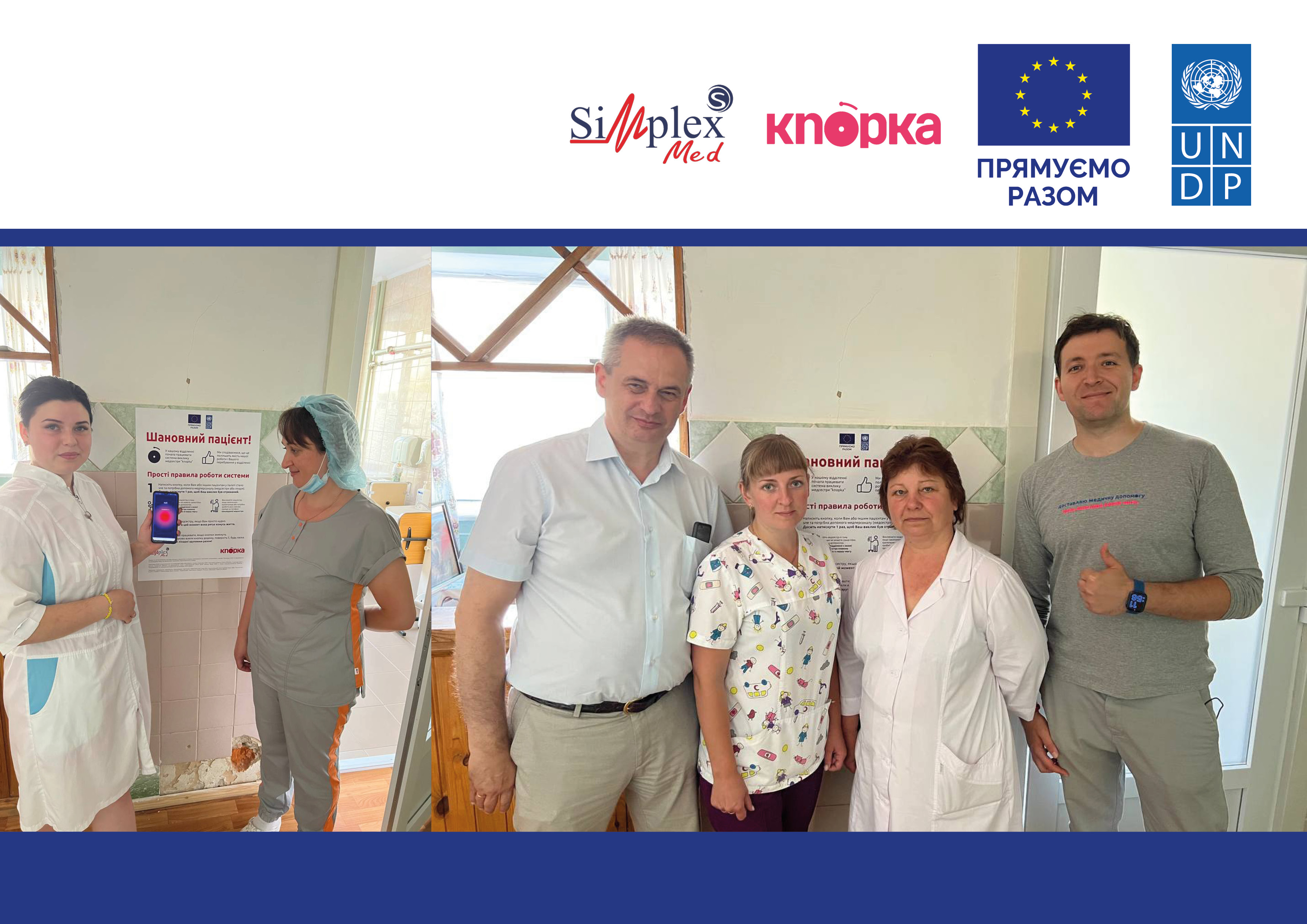UNDP, with the support of the European Union, provides an advanced communications system that informs medical staff about patient needs and records whether care has been provided promptly
A hospital in Chernihiv gets a new alert system
August 5, 2022

Dmytro Rudenko, the director general of the Chernihiv Central District Hospital (middle), with the medical staff of the Department of Traumatology and Orthopedics of the Chernihiv Central District Hospital, (on the right) Ivan Osadchyi, Head of the Knopka project. Chernihiv, Ukraine, 30 June 2022.
Kyiv, 5 August 2022 – Doctors in communities along the front lines of war in Ukraine work under increased pressure as number of those affected by hostilities remains high. What is more, the facilities in which they work are often becoming targets of violence – since the Russian invasion began in February more than 900 health facilities have been destroyed or damaged, obstructing delivery of and access to healthcare.
Frederik Coene, Head of Cooperation at the EU Delegation to Ukraine, said that the European Union, together with international partners, will continue supporting the health care sector to help it endure these difficult times: “Ukrainians should have wide access to quality medical care,” he said. “Medical workers who continue working in tough wartime conditions must be provided with everything they need.”
Chernihiv, a city 150 kilometres northeast of Kyiv, has often been in the front line of hostilities, resulting in massive damage to its infrastructure, including medical facilities. The workload on the Chernihiv Central District Hospital and its employees has also increased, and the admission level of the wounded and vulnerable people remains high.
To help the hospital better manage its growing workload, UNDP, within UN Recovery and Peacebuilding Programme and with the financial support of the European Union, provided a smart notification system for the surgical, neurological, therapeutic and intensive care departments. The emergency call system for medical personnel is equipped with software that records the information about the number and speed of calls received by medical personnel. In addition, the emergency call buttons are wireless, waterproof, and uses signal lamps placed near a patient’s room or in separate rooms that duplicate the call for medical personnel.
Manal Fouani, interim UNDP Resident Representative in Ukraine, said the doctors operating along the front lines often work around the clock caring for patients and war wounded. “Their efforts are heroic, but often hampered by inadequate medical instruments or damaged equipment.”
Fouani said that UNDP is directing much of its efforts to ensuring that “the huge and growing number of Ukrainians affected by the war, as well as vulnerable groups of patients, including children and low-mobility persons, have access to effective, efficient and fully operational medical institutions catering to diverse medical needs.”
Dr. Valerii Vasylynchuk, head of the surgical department of the Chernihiv Central District Hospital, said the new system will reduce the burden on the medical staff. “Our department is constantly overcrowded,” he said. “All 60 available beds are occupied. Now each bed is equipped with a button, which significantly optimizes our work, making us more efficient and effective.”
Background
The United Nations Recovery and Peacebuilding Programme (UN RPP) is being implemented by four United Nations agencies: the United Nations Development Programme (UNDP), the UN Entity for Gender Equality and the Empowerment of Women (UN Women), the United Nations Population Fund (UNFPA) and the Food and Agriculture Organisation of the United Nations (FAO).
Twelve international partners support the Programme: The European Union (EU), the European Investment Bank (EIB), the U.S. Embassy in Ukraine, and the governments of Canada, Denmark, Germany, Japan, the Netherlands, Norway, Poland, Sweden and Switzerland.
Media enquiries
Yulia Samus, UNDP Ukraine Communications Lead; e-mail: yuliia.samus@undp.org

 Locations
Locations



